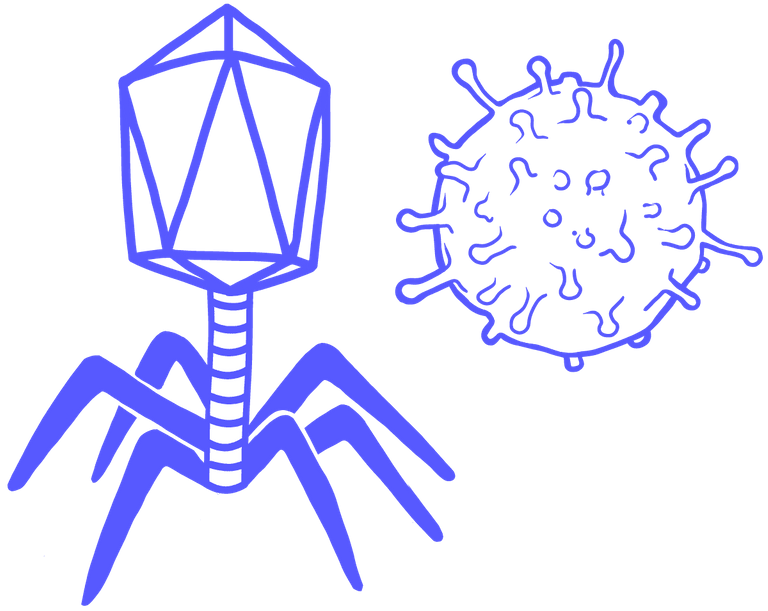Viral and Bacteria Infections are Completely Different and Treated as Such
I am not a storyteller, but let me tell you a story as I begin this post. Actually, it isn't going to be a story all through as I will be discussing about the topic as well but you know they say good storytellers are good writers. So let's bring science and story together.
Ben woke up feeling with a fever, he feels there is something wrong with his body system. He is feeling sick to the stomach and so he decided to drive to the hospital to see the doctor so he can give him a pill or prescription so he can take and get over this sick feeling. Explaining to the doctor how he felt from body pain, cramps, and diarrhea, which accompanied the fever. He just wants an antibiotic that will deal with those bedeviled bacteria but then the doctor decides to run a blood and urine test instead and tells Ben that he might be suffering from a viral infection.
A lot of like Ben are so quick to use antibiotics even for fungal infections without any prescriptions, and when we get to the hospital, we sound kind of coursing to the doctor telling them to give us antibiotics because your gut tells you that it is a bacterial infection. Since in Ben's case it is a viral infection, antibiotics do not work on the virus. Although they are both microbes viruses are extremely smaller than bacteria.
It is easy to see why a lot of people would believe they have a bacterial infection even when they have a viral infection since both of them can be transmitted through contact with infected people, animals, or even from surfaces and food, causing almost similar onset symptoms like pain, digestive upset, respiratory distress, fever, and so on but they are two completely different organisms. One is neither dead nor alive and needs a living host to replicate (virus), while the other is a single living cell that can reproduce on its own either with a living or no living being present.
It is doubt that bacteria is very important in our world, and many bacteria are harmless to us including the ones used to make our yogurt and probiotic yogurt. They can also be found in our body living and helping us live. Scientists have shown that we are only about 40% human cells with almost 60% of our makeup cells being microbial cells and nonhuman. Only about 1% of bacteria are harmful to humans, and this percentage can be very deadly in some cases.
Nearly all viruses are disease-causing in humans, and they will need a host to live and replicate. They target cells and replicate using the cell's mechanism before killing the cells as they burst out of it to another one. Viruses are responsible for a lot of diseases including common flu, chicken pox, shingles, hepatitis, herpes, and even Lassa fever. To give an insight into how deadly viruses are, the deadliest pandemics in history are caused by viruses.
You might then want to ask why people still get a viral infection after being vaccinated. Well, vaccination isn't a guarantee that one won't fall ill from the virus. You see, viruses mutate continually, and the strains might be different from that of the vaccine you took. Vaccines expose the body to the viral antigen in an inactive phase. Vaccines can be useful for people who haven't gotten the virus, but not for people who are already infected with the virus.
When it comes to being infected with a virus, antiviral drugs are used to treat them. The antiviral drug would either interfere with enzymes that would help the virus replicate, or prevent the virus from infecting another cell but they do not destroy the virus. Researchers have been able to use laser light blasting can be used to damage the virus's outer shell and deactivating the virus.
Read More
https://www.sciencedaily.com/releases/2007/11/071101084950.htm
https://www.ncbi.nlm.nih.gov/pmc/articles/PMC4171215/
https://www.ncbi.nlm.nih.gov/pmc/articles/PMC6094972/
https://www.ncbi.nlm.nih.gov/pmc/articles/PMC4425030/
https://effectivehealthcare.ahrq.gov/health-topics/bacterial-infections
https://www.ncbi.nlm.nih.gov/books/NBK8174/


Thanks for your contribution to the STEMsocial community. Feel free to join us on discord to get to know the rest of us!
Please consider delegating to the @stemsocial account (85% of the curation rewards are returned).
Thanks for including @stemsocial as a beneficiary, which gives you stronger support.
Congratulations @thomisin! You have completed the following achievement on the Hive blockchain And have been rewarded with New badge(s)
Your next target is to reach 2500 upvotes.
You can view your badges on your board and compare yourself to others in the Ranking
If you no longer want to receive notifications, reply to this comment with the word
STOPCheck out our last posts: